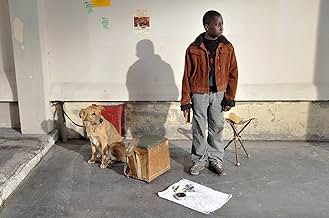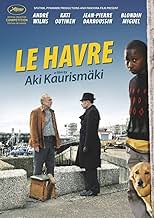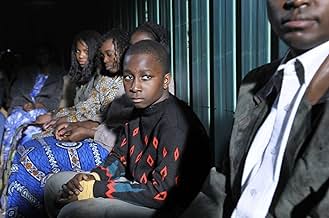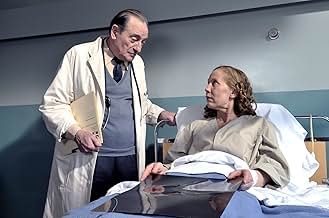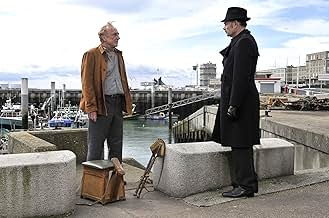CALIFICACIÓN DE IMDb
7.2/10
25 k
TU CALIFICACIÓN
Un joven africano llega al puerto de El Havre en un carguero. Un limpiador de zapatos entrado en años lo acoge en su hogar.Un joven africano llega al puerto de El Havre en un carguero. Un limpiador de zapatos entrado en años lo acoge en su hogar.Un joven africano llega al puerto de El Havre en un carguero. Un limpiador de zapatos entrado en años lo acoge en su hogar.
- Premios
- 15 premios ganados y 34 nominaciones en total
Quoc Dung Nguyen
- Chang
- (as Quoc-Dung Nguyen)
Little Bob
- Little Bob
- (as Roberto Piazza)
- Dirección
- Guionista
- Todo el elenco y el equipo
- Producción, taquilla y más en IMDbPro
Opiniones destacadas
Like every fairy-tale, this film by Aki Kaurismaki is unbelievable, but this apparent fake doesn't hide a sad reality behind the good intentions of the simple people that help the illegal immigrant child to arrive finally to London, wherein we couldn't predict what kind of life waits for him. A slow rhythm, (some scenes seem like stills), and a brilliant and strong color that contribute to the atmosphere of unreality, the frustration to the normal expectations of the viewers that are carried to imagine the worst, and receive on the contrary the sudden impact of the best, don't prevent to bring to the conscience the images of the cruel world that surrounds the miracle of solidarity that saves, perhaps momentarily, just one of the hundred persecuted. The bad and the good boys are generally discovered by the camera, which leaves, significantly, in off the figure of the pitiless chief of policy, and introduces in darkness the figure of the denouncer. Le Havre is an optimist movie with a very dubious happy end.
This was one of the most visually stunning films I've ever seen. You could pause very nearly every shot and use it as screensaver or make a large print of it; that's how beautiful and well thought out they are.
Aki Kaurismäki evokes a sense of times past. He embraces the 'unreality' of his film, and the genre as a whole, and plays it up with great wit and art. As mentioned by previous reviews, he combines tragedy and comedy seamlessly into an extremely enjoyable and engaging film that doesn't try to pass itself off as life and as such engages on much deeper levels than its straightforward message or story would perhaps imply.
There are so many small details and well-thought out quirks here that keep your attention that it easily accommodates for my internet fried attention span, even while the director chooses not to openly deal with the electronic world. It's a decision indicative of the thoughtful and unique approach to the film; it aids both the storyline and the viewer's experience immensely. I was grateful and relieved to be taken away into a simpler and more honest world; both in the film's outward image, and within the story's universe. Its worth emphasising; this film doesn't try to masquerade as real life and as such allows for a much purer enjoyment. You don't have to worry about checking your expectations once the end credits roll.
Being beautifully shot may not have kept my attention for an hour and half, but the storyline and Kaurismäki's wit certainly did.
Aki Kaurismäki evokes a sense of times past. He embraces the 'unreality' of his film, and the genre as a whole, and plays it up with great wit and art. As mentioned by previous reviews, he combines tragedy and comedy seamlessly into an extremely enjoyable and engaging film that doesn't try to pass itself off as life and as such engages on much deeper levels than its straightforward message or story would perhaps imply.
There are so many small details and well-thought out quirks here that keep your attention that it easily accommodates for my internet fried attention span, even while the director chooses not to openly deal with the electronic world. It's a decision indicative of the thoughtful and unique approach to the film; it aids both the storyline and the viewer's experience immensely. I was grateful and relieved to be taken away into a simpler and more honest world; both in the film's outward image, and within the story's universe. Its worth emphasising; this film doesn't try to masquerade as real life and as such allows for a much purer enjoyment. You don't have to worry about checking your expectations once the end credits roll.
Being beautifully shot may not have kept my attention for an hour and half, but the storyline and Kaurismäki's wit certainly did.
These days it seems that French films predominantly fit into one of two categories: Smug, over long and preachy, such as Rust and Bone or Little White Lies. Or they produce deeply involving but simplistic stories containing the most genuine heartfelt emotion such as Amour (in French, therefore French) or The Kid with a Bike. I am happy to say that Le Havre falls in the latter group. In fact the story here is one of pure simplicity and the tone of the film contains nothing but genuine optimism towards the theme of human compassion. That is it, this film has no ulterior motive or no gimmicks, and it is a very simply and extremely involving story based around that one simple theme. However, this film is not just a tribute to human compassion, but contained within it are tributes to the history of cinema that are quite simply a joy to experience. When I say that, the use of music as well the way certain scenes are lit pay a respectful tribute to films of the 40s and 50s throughout the narrative.
This is not to say that this film is not without its realism, Marx and his neighbours all live a humble life bordering on poverty. The plight of Idrissa is unenviable and there is an honest depiction of a refugee camp just outside Calais. However, the theme of Le Havre is not that life is simply good, that would be naive. It is how these characters deal with life and the situations that it presents. Of course it would be so easy to fall into to the trap of patronising and borderline preachy cliché here, but this never happens due to the genuine feeling of honesty depicted throughout the narrative. Every character is presented very honestly with all their flaws quite clear to see, but it is their ability for natural compassion that drives the narrative forward. By the time Le Havre reaches its very satisfying conclusion where there are no loose ends, it is difficult not to feel that not only have you been entertained, but also enlightened.
This is not to say that this film is not without its realism, Marx and his neighbours all live a humble life bordering on poverty. The plight of Idrissa is unenviable and there is an honest depiction of a refugee camp just outside Calais. However, the theme of Le Havre is not that life is simply good, that would be naive. It is how these characters deal with life and the situations that it presents. Of course it would be so easy to fall into to the trap of patronising and borderline preachy cliché here, but this never happens due to the genuine feeling of honesty depicted throughout the narrative. Every character is presented very honestly with all their flaws quite clear to see, but it is their ability for natural compassion that drives the narrative forward. By the time Le Havre reaches its very satisfying conclusion where there are no loose ends, it is difficult not to feel that not only have you been entertained, but also enlightened.
In 1992, Finnish director Aki Kaurismaki directed LA VIE DE BOHEME, where he transplanted to Paris for a story of impoverished, failed artists on the cusp of society. A funny, sad film about art, love, and loss. Nearly twenty years later, Kaurismaki returns to France in LE HAVRE; while some of the humor remains, its story of the impoverished and dispossessed is even more affecting.
LA VIE... showed a painterly visual sense, all the more amazing that it was filmed in black and white. LE HAVRE boasts an equally striking visual sense, with scenes that seem to glow. That said, other elements of the production are less convincing - and at times. almost embarrassing. (For example, a group of black refugees are locked in a container crate for almost a week; when it's opened, no one's hungry or even concerned, and several are freshly shaved.)
LE HAVRE sets up the camera in a stationary spot - much like an old silent - giving the film a real resonance. But this affection for older filmmaking will be familiar for Kaurismaki fans; his silent, black and white JUHA uses the same minimalistic approach, with good results.
If you're willing to forgive certain production details and the dependence on melodrama, LE HAVRE is a feel-good story of how those of modest means can help those in desperate straits. (LE HAVRE itself was directed under low budget.) The film's humanism is its saving grace. While the filmmaking is occasionally awkward, there's still a lot to be admired here.
LA VIE... showed a painterly visual sense, all the more amazing that it was filmed in black and white. LE HAVRE boasts an equally striking visual sense, with scenes that seem to glow. That said, other elements of the production are less convincing - and at times. almost embarrassing. (For example, a group of black refugees are locked in a container crate for almost a week; when it's opened, no one's hungry or even concerned, and several are freshly shaved.)
LE HAVRE sets up the camera in a stationary spot - much like an old silent - giving the film a real resonance. But this affection for older filmmaking will be familiar for Kaurismaki fans; his silent, black and white JUHA uses the same minimalistic approach, with good results.
If you're willing to forgive certain production details and the dependence on melodrama, LE HAVRE is a feel-good story of how those of modest means can help those in desperate straits. (LE HAVRE itself was directed under low budget.) The film's humanism is its saving grace. While the filmmaking is occasionally awkward, there's still a lot to be admired here.
Great. Very stylistic in its cinematography and lighting. Condensed and to the bone in its storytelling and editing.
Nice and subtle humour on the background of a highly contemporary story about our unbalanced globe, the hope for freedom and the power of human compassion.
I Truly enjoyed watching a film in which every scene is so carefully and skillfully arranged. This is Kaurismäki at his best working with a great cast and a script stripped of any unnecessary dialogue. The colors and the settings are stunning. There's always a risk that movies like this would come across as to polished or constructed, but from my point of view Kaurismäki strikes a great balance and makes sure that every image adds layers and details to the story.
Nice and subtle humour on the background of a highly contemporary story about our unbalanced globe, the hope for freedom and the power of human compassion.
I Truly enjoyed watching a film in which every scene is so carefully and skillfully arranged. This is Kaurismäki at his best working with a great cast and a script stripped of any unnecessary dialogue. The colors and the settings are stunning. There's always a risk that movies like this would come across as to polished or constructed, but from my point of view Kaurismäki strikes a great balance and makes sure that every image adds layers and details to the story.
¿Sabías que…?
- TriviaThe character Marcel Marx, played by André Wilms, first appears in La vie de bohème (1992). Jean-Pierre Léaud also appears in both films, but as different characters.
- Citas
Marcel Marx: L'argent circule au crepuscule.
- ConexionesFeatured in At the Movies: Cannes Film Festival 2011 (2011)
- Bandas sonorasMatelot
Performed by The Renegades
Selecciones populares
Inicia sesión para calificar y agrega a la lista de videos para obtener recomendaciones personalizadas
- How long is Le Havre?Con tecnología de Alexa
Detalles
Taquilla
- Presupuesto
- EUR 3,850,000 (estimado)
- Total en EE. UU. y Canadá
- USD 611,709
- Fin de semana de estreno en EE. UU. y Canadá
- USD 26,363
- 23 oct 2011
- Total a nivel mundial
- USD 12,959,706
- Tiempo de ejecución
- 1h 33min(93 min)
- Color
- Relación de aspecto
- 1.85 : 1
Contribuir a esta página
Sugiere una edición o agrega el contenido que falta


